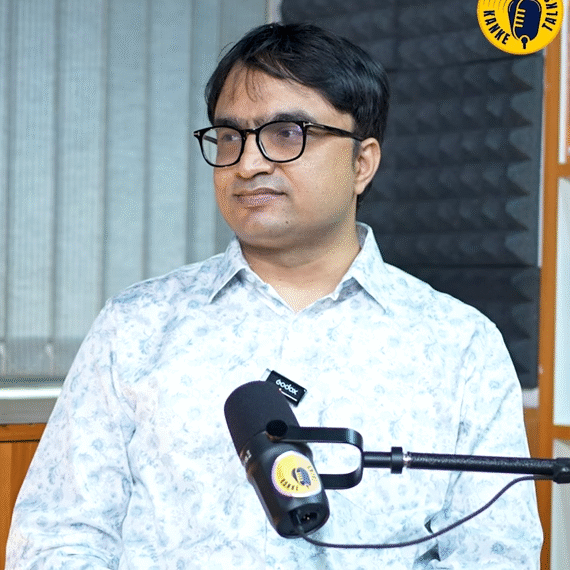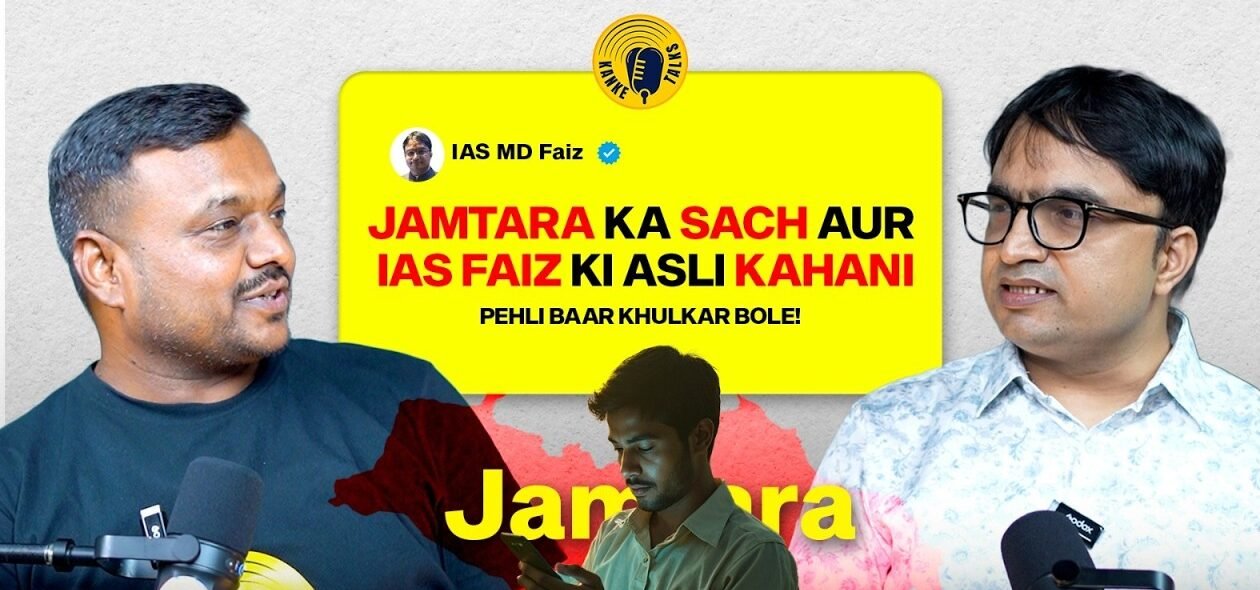In the lands once whispered about for scams and cybercrime, a new narrative is being written — not with keystrokes that deceive, but with books that enlighten.
This is the story of IAS Faiz Mumtaz, a man who took one of India’s most “infamous” districts, Jamtara, and turned it into a beacon of change — one library at a time.
Chapter 1: Jamtara — A Tale of Two Realities
Once upon a time, the name Jamtara sparked only one association: cybercrime. It was a district caricatured by crime dramas, feared for scams, and resigned to its label as a digital crime hotspot. But as Faiz Mumtaz, District Collector (DC) of Jamtara at the time, saw it — this wasn’t the full picture.
“I met children during field visits who had never stepped beyond the village,” he recalled.
“Especially girls — their education stopped where the village school ended. Most families couldn’t afford to send them to Patna, Ranchi, or Delhi for coaching.”
This wasn’t just a district plagued by crime. It was a place waiting for a chance — waiting for hope.
That hope came in the form of libraries.

Chapter 2: The Library Rebellion
There was no state-sponsored mandate, no pre-existing scheme. It began with a simple idea:
What if education came to them?
Old, crumbling buildings were renovated. CSR funds brought in furniture, chairs, water filters. Books poured in through donations. Every Panchayat had its own library. But what made this more than just infrastructure was the ownership it created. Students were grouped into Library Management Committees. They opened bank accounts. They raised funds during festivals.
It became their space — their pride.
“And the response was overwhelming,” Faiz said. “Some libraries had so many students that we had to run them in shifts.”
From zero access to education to self-sustaining learning hubs — Jamtara was changing.
Chapter 3: Hope as the Antidote to Crime
Crime, Faiz believes, doesn’t thrive in places filled with possibility — it breeds in despair.
“People turn to crime when they lose hope. That’s where we, as administrators and guardians, step in.”
The myth of cyber brilliance in Jamtara — often exaggerated by media — needed correcting. These were not hackers building malware.
They were fifth and eighth-grade dropouts, using script-based frauds, mimicking voices, and manipulating victims over phone calls.
“It’s fraud, not skill,” he said bluntly.
Still, the underlying issue was opportunity.
“Give direction, give hope — and they’ll choose the right path,” he said. And the libraries became that direction.
Chapter 4: The Elders Club – Healing Loneliness
As if the libraries weren’t legacy enough, Faiz’s most emotionally resonant initiative was born during COVID-19: The Elders Club.
“I met an old man who looked healthy but said he wanted to die. His wife had passed away. His children had children of their own. He felt invisible.”
That hurt Faiz deeply. So he launched a revolutionary idea: a club for senior citizens in every block.
Old buildings were transformed into cozy gathering spots — complete with sofas, carrom, TV, newspapers, and even religious books.
The elderly found community again. Friendships bloomed. Children visited once a month to share stories and songs with their “new” grandparents.
“That,” Faiz says, “was the project closest to my heart.”
Chapter 5: The Accident That Changed It All
Faiz wasn’t always on the path to public service.
Born into a family of doctors in Muzaffarpur, Bihar, expectations were clear — he’d wear a white coat like the rest. But Faiz rebelled. He chose hotel management at IHM Pusa instead, against family wishes.
“There was a taboo,” he laughed. “They imagined I’d be serving alcohol and washing dishes.”
Then came the accident. A high-speed bike crash in Delhi shattered both his forearm bones. Four surgeries followed, spread over three years.
In that stillness — confined to a hospital bed — Faiz’s introspection began.
“I asked myself, what have I done with my life?”
And the answer came swiftly: UPSC.
Chapter 6: UPSC with Plaster and Purpose
With no background in civil services, Faiz dove into preparation, plaster still on his hand. Despite physical pain and long gaps since academics, he pushed through.
“If you enjoy what you’re doing, no one can stop you,” he said.
In his second attempt, still healing from surgeries, he cleared the UPSC exam and entered the Indian Administrative Service in 2014.
What many considered impossible, Faiz turned into his truth.
“Excuses are easy,” he said. “But they don’t serve you. I didn’t want to be someone people pitied.”
Chapter 7: Life After IAS – No Halo, Just Work
Power didn’t change Faiz.
“I was the same before, I’m the same now,” he said.
Friends from hotel management and school still hang out with him. There’s no pedestal, no façade.
“Some call me down-to-earth. Others might think I’m rude. It’s perception,” he shrugged. “But I try to remain grounded.”
As an officer, he doesn’t believe in grand plans for the sake of it.
“If we just implement routine things with sincerity — that itself is a contribution.”
Chapter 8: Farmer First, Policy Later
Now working in the horticulture and marketing board, Faiz focuses on implementation. He’s candid about systemic challenges — manpower shortages, policy bottlenecks, and the mismatch between high expectations and limited infrastructure.
But he believes in solutions.
“There’s no point in bumper production if farmers still suffer. Diversification is key — animal husbandry, fisheries, agri-tourism. We must create parallel income streams.”
He’s bullish on agri-tourism.
“People want to connect with nature. If we build circuits, improve homestays, and market properly, Jharkhand could boom post-COVID.”
Chapter 9: Jharkhand — The Sleeping Giant
Faiz sees enormous potential in Jharkhand.
“40% of India’s minerals lie here. The forests are beautiful. The people — especially the tribal communities — are gentle, loving, and peaceful.”
He disputes the claim that crime holds Jharkhand back.
“There’s crime everywhere. But here, people are warm. Naxalism has faded. Now’s the time to market the state right.”
Yet, he adds, development is subjective.
“For one, it’s a 25-storey apartment. For another, it’s a small house with a kitchen garden. But if roads, health, and education improve — that’s real progress.”
Chapter 10: On EQ, Not Just IQ
Faiz places a high premium on emotional intelligence.
“Compassion is more important than IQ in administration,” he said. “You can’t fix what you can’t feel.”
From resolving elder abuse cases under the Senior Citizen Act to guiding youth away from crime, Faiz leads with empathy.
“If you don’t feel people’s pain, you can’t help them.”
He believes an officer must be accessible, fair, and never make anyone feel small — no matter their background.mall house with a kitchen garden. But if roads, health, and education improve — that’s real progress.”
Chapter 11: A Community, Not a Caste
When asked about education levels in his community, Faiz refuses to generalize.
“It’s more about economics than community. Poor is poor — whether SC, ST, or Muslim.”
Yet, he acknowledges the need for leadership and awareness within minority groups.
“We’re learning. Slowly, we’re moving forward.”
And his leadership, quietly but surely, inspires that progress.at’s real progress.”
Chapter 12: Dreams Fulfilled, Eyes Open
Faiz doesn’t dream in the usual sense.
“I live in the moment,” he says. “I’ve already received more than I ever expected.”
But his contentment doesn’t translate to complacency. He still wakes early, gets his kids ready, and keeps one foot grounded at home — no matter the office designation.
His father — a composed, patient doctor — remains his role model.
“I still try to be like him, but I fall short,” Faiz admits. “His honesty, patience… I admire that deeply.”
Final Chapter: The Meaning of It All
If there’s one philosophy Faiz Mumtaz lives by, it’s this:
Struggle is not punishment — it’s the path.
“Enjoy the struggle. That’s where the fun is. Once you achieve your goal, it’s over. But the journey — that’s your character, your story, your meaning.”
For those fighting shadows — be it poverty, pain, or prejudice — Faiz doesn’t offer easy inspiration.
He offers realism wrapped in warmth.
His story isn’t just one of libraries or policies. It’s the story of a man who believed that even in a district known for scams, knowledge could bloom. That even when your bones break, your spirit doesn’t have to.
That even as an IAS officer, your most meaningful act could be listening to an old man who just wants to be heard.
And that, truly, is a story worth telling.

No responses yet